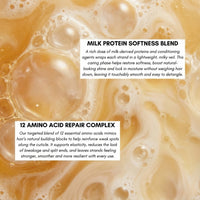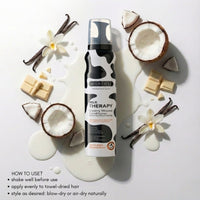Why Hair Care Is Important: Benefits and Tips for Healthy Hair
Posted by MORFOSE COSMETICS
Why Hair Care Is Important: Benefits and Tips for Healthy Hair
Hair can play a significant role in our lives, as it is often closely tied to our identity and self-esteem. From a young age, we learn to use our hair to express ourselves, whether by experimenting with new hairstyles or coloring it in unique ways. However, as we age, we begin to realize the importance of caring for our hair beyond its aesthetic value.
The Importance of Hair Care
Regardless of our hair type or texture, taking care of our hair is essential to maintaining its health and vitality. Many factors can contribute to damage or hair loss, including exposure to sun and heat, harsh chemicals, and improper styling techniques. By adopting healthy hair care practices, we can prevent damage and promote growth, helping us look and feel our best.
One of the most important things we can do for our hair is to keep it clean. Regular washing with a gentle shampoo can help remove dirt, oil, and product buildup, which can weigh hair down and make it look dull. It's also important to condition our hair regularly to keep it hydrated and nourished. Deep conditioning treatments can be especially beneficial for those with dry or damaged hair.
The Role of Hair in Our Lives
Our hair holds a unique significance in our lives, as it can represent different things to different people. It can signify strength, beauty, cultural identity, and even overall health. For many people, their hair is a defining feature that they take great pride in. This is especially true for those who have experienced hair loss or thinning, which can be a source of great emotional distress.
However, our hair can also be a source of frustration and stress, particularly when it doesn't behave the way we want it to. This can lead to excessive heat styling, chemical treatments, and other damaging practices that can ultimately harm our hair and scalp.
How Hair Health Affects Overall Well-being
The health of our hair can also impact our overall wellbeing, both physically and mentally. For example, hair loss or thinning can lead to a decrease in self-confidence, while maintaining healthy hair can boost self-esteem and self-image. Additionally, poor hair health can be a sign of underlying health issues, such as vitamin deficiencies or hormonal imbalances, making it essential to take care of our hair as a part of our overall health routine.
When it comes to hair care, prevention is key. By adopting healthy hair care practices early on, we can avoid many of the common problems that can lead to hair damage and loss. This includes avoiding excessive heat styling, chemical treatments, and tight hairstyles that can pull on the hair and scalp. It's also important to protect our hair from environmental factors, such as sun and wind exposure, which can dry out and damage our hair.
Ultimately, taking care of our hair is about more than just looking good. It's about feeling good, both inside and out. By prioritizing our hair health, we can improve our overall wellbeing and enjoy all the benefits that come with healthy, vibrant hair.
Benefits of Proper Hair Care
The benefits of proper hair care extend beyond simply improving our physical appearance. By taking care of our hair, we can promote growth and strength, prevent damage, and improve scalp health and hygiene. Let's take a closer look at some of the benefits of proper hair care.
Improved Hair Growth and Strength
Consistently implementing healthy hair care practices, such as avoiding heat styling and using protective styles, can promote hair growth and strength. In addition to these practices, incorporating a balanced diet and proper hydration can help nourish hair from the inside out, promoting overall hair health. Foods rich in vitamins and minerals, such as biotin, vitamin E, and iron, can help promote healthy hair growth and prevent hair loss. Drinking plenty of water can also help keep hair hydrated and healthy.
Another way to promote hair growth and strength is through regular scalp massages. Massaging the scalp can increase blood flow to the hair follicles, promoting healthy hair growth. You can use your fingers or a scalp massager to gently massage the scalp for a few minutes each day.
Prevention of Hair Loss and Damage
Proper hair care can also help prevent hair loss and damage, such as split ends and breakage. Taking steps to avoid harsh chemicals and excessive heat can reduce the chances of hair damage. When using heat styling tools, be sure to use a heat protectant spray to minimize damage. You can also use protective styles, such as braids or twists, to reduce the amount of manipulation your hair undergoes, thereby reducing the risk of breakage.
Regular trims and maintenance can also prevent split ends from spreading and leading to further damage. It's recommended to get a trim every 6-8 weeks to keep split ends at bay.
Enhanced Appearance and Confidence
Maintaining healthy hair can enhance our appearance and lead to greater confidence and self-esteem. When our hair looks and feels its best, we feel more confident in presenting ourselves to the world and can feel more comfortable in our own skin. Taking care of our hair can also help us feel more put-together and polished, which can positively impact our professional and personal lives.
Scalp Health and Hygiene
Proper hair care also involves taking care of our scalp, which can further promote hair health and prevent issues such as dandruff and other scalp conditions. By regularly washing and conditioning our hair and avoiding harsh chemicals, we can maintain a healthy scalp and promote overall hair health.
In addition to washing and conditioning, there are other steps we can take to promote scalp health. For example, using a scalp scrub can help exfoliate the scalp and remove any buildup of oil or product. A healthy scalp can also be achieved through a balanced diet and proper hydration, as mentioned earlier.
In conclusion, proper hair care is essential for maintaining healthy, strong, and beautiful hair. By following healthy hair care practices, we can promote hair growth and strength, prevent damage, enhance our appearance and confidence, and improve scalp health and hygiene.
Essential Hair Care Tips
Adopting healthy hair care habits and practices is essential to promoting overall hair health. Below are a few tips to help maintain healthy hair.
Choosing the Right Hair Care Products
Choosing the right hair care products is crucial to hair health, as different hair types require different products. Be sure to use products formulated for your hair type and needs, such as sulfate-free shampoos for color-treated hair or moisturizing conditioners for dry hair.
It is also important to read the labels of hair care products and avoid those containing harsh chemicals, such as sulfates and parabens, which can strip the hair of its natural oils and lead to dryness and damage.
Washing and Conditioning Techniques
Proper washing and conditioning techniques can also make a significant impact on hair health. Avoid using hot water, which can cause damage and scalp irritation, and instead use lukewarm or cool water. Additionally, be sure to rinse your hair thoroughly to remove all product residue.
When washing your hair, avoid scrubbing too vigorously, as this can cause damage to the hair follicles and lead to breakage. Instead, gently massage the scalp with your fingertips to promote blood flow and stimulate hair growth.
Proper Hair Drying and Styling Practices
Excessive heat can cause hair damage, so it is crucial to use heat styling tools sparingly and on low heat settings. Air drying hair is also a less damaging alternative to blow-drying. Additionally, investing in quality styling tools, such as brushes and combs, can make a significant difference in preventing breakage and damage.
When using heat styling tools, be sure to use a heat protectant spray to minimize damage. It is also important to avoid using tight hair ties or elastics, as these can cause breakage and damage to the hair.
Regular Hair Trimming and Maintenance
Regular trims and maintenance are essential to preventing split ends and promoting hair growth. It is recommended to trim hair every six to eight weeks to prevent split ends from spreading and leading to further damage.
In addition to regular trims, it is important to maintain a healthy diet and lifestyle to promote overall hair health. Eating a balanced diet rich in vitamins and minerals, staying hydrated, and getting enough sleep can all contribute to healthy, strong hair.
Hair Care for Different Hair Types
Each hair type requires different care and maintenance, and understanding your hair type is crucial to proper hair care. Below are a few tips for caring for different hair types.
Caring for Straight Hair
Straight hair is often more prone to oiliness and requires washing more frequently. However, it's important not to over-wash straight hair, as this can strip away natural oils and lead to dryness and brittleness. When washing straight hair, use a gentle shampoo and conditioner that won't weigh it down. It's also a good idea to use lightweight, volumizing hair products to help avoid a flat, weighed-down look. For those who want to add a little texture or volume, using a salt spray or texturizing spray can work wonders.
In addition to proper washing and styling, it's important to protect straight hair from damage. Avoiding heat styling or using low heat settings can prevent damage and brittleness. If you do use heat styling tools, be sure to use a heat protectant spray or serum to minimize damage.
Caring for Wavy and Curly Hair
Wavy and curly hair can be more prone to dryness and frizz, making regular conditioning and moisturizing critical. When washing wavy or curly hair, use a sulfate-free shampoo and a moisturizing conditioner to help keep hair hydrated. It's also important to avoid over-washing, as this can strip away natural oils and lead to dryness.
Using a wide-toothed comb or your fingers to detangle hair can also prevent breakage and damage. When styling wavy or curly hair, it's best to let it air-dry whenever possible. If you do use a blow dryer, use a diffuser attachment to help maintain natural curls.
In addition to proper washing and styling, it's important to protect wavy and curly hair from damage. Avoiding heat styling can help maintain natural curls, but if you do use heat styling tools, be sure to use a heat protectant spray or serum to minimize damage.
Caring for Coily and Kinky Hair
Coily and kinky hair are often more delicate and require extra care and attention. Regular co-washing, or washing hair with conditioner instead of shampoo, can help avoid dryness and breakage. When washing coily or kinky hair, use a moisturizing conditioner and avoid over-washing, as this can strip away natural oils and lead to dryness.
Using protective styles, such as braids or twists, can prevent damage from excessive manipulation. When styling coily or kinky hair, it's important to use gentle techniques and avoid using heat styling tools whenever possible. If you do use heat styling tools, be sure to use a heat protectant spray or serum to minimize damage.
In addition to proper washing and styling, it's important to keep coily and kinky hair hydrated. Using a leave-in conditioner or hair oil can help keep hair moisturized and prevent dryness and breakage.
By following these tips, you can help keep your hair healthy and beautiful, no matter what your hair type may be.
Conclusion
Proper hair care is essential for maintaining healthy, strong, and vibrant hair. Understanding your hair type and adopting healthy hair care practices can promote growth and strength, prevent damage and hair loss, and enhance overall appearance and confidence. By following these tips and incorporating healthy hair care practices into your routine, you can achieve healthy, lustrous hair and feel your best.



